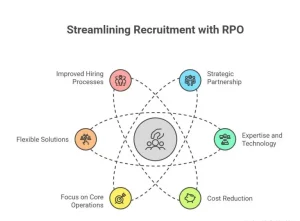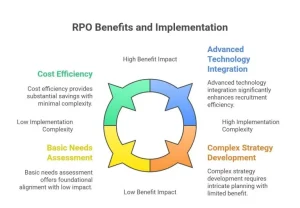In the competitive market of today, it is more challenging than ever to find and retain top talent. That’s where RPO comes into play! Recruitment Process Outsourcing is a strategic step under which businesses outsource their hiring process to a third party. It enables businesses to efficiently streamline their hiring processes. Experts find talent that enhances candidate quality. Ultimately, it reduces time-to-hire—all while focusing on their core operations.
A startup looking to build a strong team or an established company aiming to scale, RPO caters to all. RPO offers a flexible solution. That is tailored to your unique needs. Say goodbye to recruitment headaches and hello to a smarter way – A path of attracting and retaining the talent your business deserves!
Understanding Recruitment Process Outsourcing
Recruitment Process Outsourcing is a strategic approach under which companies outsource their recruitment process in UAE to an external partner. Allowing an organization to leverage an external service provider’s expertise, technology, and talent pool. These resources can be utilized for their own recruiting process. Even without the overheads of an in-house hiring process. RPO can follow any number of stages, ranging from job profiling, candidate sourcing, interviews, selection, and eventually onboarding.
The main benefits of RPO are the improvement of hiring processes and speedier placements with better candidates. Providers draw on their data-driven intelligence to guide recruitment initiatives and assist companies in putting the right talent in their workplaces without wasting much time. By outsourcing recruitment, firms can then cut costs, reduce administrative workloads, and focus on core business activities to stimulate growth and innovation. RPO provides a flexible solution, whether it is temporary, permanent, or anything in between.
What is RPO?
Recruitment Process Outsourcing in the UAE, commonly known as RPO, is a strategic partnership. Organizations outsource their recruitment processes to an external service provider. The outsider to whom the process is outsourced is the RPO.
RPO providers manage the entire recruitment lifecycle, including:
- Job analysis
- Candidate sourcing
- Interviewing, and
- Onboarding
The approach allows businesses to leverage specialized expertise and technology. They can have a more efficient hiring process. Organizations can focus on their core operations by integrating RPO into their HR strategy. While still attracting top talent.

Benefits of RPO
The list is quite long when it comes to talking about the benefits of RPO. When the whole hiring process is outsourced, the cost is reduced to a great extent. The candidate quality has improved, and it takes a short duration to get the perfect fit for the role. We are covering each benefit in detail in the next paragraphs.
- Cost Efficiency: RPO can lead to significant cost savings. This can be achieved by reducing the need for in-house recruitment teams. Ultimately, minimizing administrative overhead. Businesses can allocate resources more effectively with a streamlined process.
- Improved Quality of Hire: RPO utilizes data-driven recruitment strategies. They have access to a broader talent pool. This, in turn, enhances the candidate’s quality. When focusing on finding the right fit, it can lead to higher employee retention rates.
- Faster Time-to-Hire: RPO providers can shorten the hiring timeline with resources and expertise. This speed is critical in today’s competitive job market. Especially where top candidates may receive multiple offers.
- Scalability and Flexibility: RPO solutions can easily scale up or down based on your hiring needs, allowing businesses to adapt to changing demands without the hassle of adjusting internal processes.
- Access to Advanced Technology: RPO providers often use state-of-the-art recruitment tools and software, giving businesses access to the latest technology for sourcing, tracking, and managing candidates.
- Enhanced Candidate Experience: A professional RPO team can improve the overall candidate experience by providing timely communication and a smooth application process, which can positively impact your employer brand.

RPO vs. Staffing Agency
Here’s a comparison table highlighting the differences between RPO and staffing agencies:
| Feature | RPO | Staffing Agency |
| Scope of Services | End-to-end HR recruitment process management | Temporary or permanent staffing solutions |
| Focus | Long-term talent acquisition strategy | Short-term placement of candidates |
| Engagement Model | Strategic partnership with ongoing recruitment needs | Transactional relationship for specific placements |
| Cost Structure | Generally based on a fee structure tied to recruitment volume | Typically charges a markup on employee salaries |
| Candidate Relationship | Develops long-term relationships with candidates | Focuses on quick placements, often with less follow-up |
| Customization | Highly customizable recruitment processes | Limited customization based on available candidates |
| Technology Utilization | Often incorporates advanced recruitment technology and analytics | May have basic systems for candidate tracking |
| Integration with HR | Seamlessly integrates with the client’s HR strategy | Operates as a separate entity from the client’s HR |
| Hiring Goals | Aims for optimal fit and long-term employee retention | Prioritizes filling positions quickly |
| Candidate Sourcing | Proactive sourcing and talent pipeline development | Reactive sourcing based on immediate client needs |
This table provides a clear comparison to help businesses understand the distinct roles and benefits of RPO and staffing agencies.
Recruitment Process Outsourcing Process
The RPO contains several steps. Before stepping forward, select your RPO partner. Must know the recruitment process outsourcing steps involved in the whole process. So that you can plan accordingly for your business.
Needs Assessment
The process starts with a detailed needs assessment. The RPO collaborates with the client to identify hiring requirements. This may include:
- Understanding the roles
- Necessary skills, and
- The company culture is to ensure alignment with organizational goals.
Strategy Development
A customized recruitment strategy is developed following the assessment. It must effectively attract the right talent, outlining sourcing methods, timelines, and performance metrics. This assists in guiding the recruitment efforts and measuring success.
Candidate Sourcing and Screening
With the strategy in place, the RPO provider begins sourcing candidates through various channels, utilizing their networks and technology. Thorough screening processes are conducted to evaluate qualifications and present a shortlist of top candidates to the client.
Onboarding and Integration
The RPO facilitates the onboarding process once candidates are selected. Ensuring a smooth transition into the organization. This contains orientation, training, and cultural integration. It fosters a positive experience that promotes employee engagement and retention.
Choosing the Right Recruitment Process Outsourcing Partner
An important phase in choosing the right RPO partner requires careful consideration. For instance, we penned down some details that help you pick the best!
Key Considerations
Evaluate industry expertise when selecting an RPO partner. Check out their technology capabilities. Know your specific hiring needs that must be aligned with them. Consider their track record in delivering results. Lastly, review their ability to adapt to your organizational culture. It is necessary for a seamless fit.
RPO Partner Evaluation
Evaluate your RPO partners by checking what services they offer, what their clients say about them, and whether they have any case studies you can review in detail. Talk to them about how they manage the process and their technology stack; understand their candidate engagement strategy before ascertaining which ones are right for your business.
Successful RPO Implementation
Successful implementation is key once you’ve chosen an RPO partner. Establish clear communication channels, define roles and responsibilities, and set performance metrics. These all help to monitor progress. Ensuring both parties are aligned and focused on shared goals.
Recruitment Process Outsourcing Trends and Future Outlook
To remain competitive, you must know the future outlook and trends of RPO. It helps you to acquire them. Being able to strategically move where your competitors are, or you can step ahead of them.
Emerging Trends
The New Recruitment Landscape. Most noteworthy about the new recruitment landscape is the AI-driven tools and data analytics that now help make candidate sourcing better and processes easier. More importantly, in recent times, there has been a greater focus on candidate experience as yet another factor in reshaping how organizations attract and engage top talent.
Challenges and Opportunities
RPO faces challenges like talent shortages and regulatory complexities. However, these issues also present opportunities for innovation. RPO partners can offer more tailored solutions by adapting to changing market demands,
The Future of Recruitment Process Outsourcing
The future of RPO will focus on technology integration along with its working components: automation and machine learning. RPO needs to make recruitment even more efficient. In an era where organizations seek agility in hiring talent, RPO shall play a more important role in addressing changing talent landscapes.
FAQs for Recruitment Process Outsourcing
What is Recruitment Process Outsourcing?
When a business outsources its entire hiring process to an external partner, it is called RPO. It streamlines recruitment and lets companies focus on growth.
How does RPO differ from a traditional recruitment agency?
Unlike agencies that fill roles quickly, RPO manages the full recruitment lifecycle. It’s strategic, long-term, customizable, and integrates with HR—while agencies focus on short-term placements.
What types of RPO models are available for businesses?
RPO models vary—end-to-end solutions, project-based support, or selective outsourcing of specific stages like sourcing or onboarding. Each model is tailored to a company’s scale, industry, and hiring needs.
What are the main benefits of using RPO?
Key benefits include reduced hiring costs, faster time-to-hire, improved quality of candidates, scalability, advanced recruitment technology, and a better candidate experience—all while freeing companies to focus on core operations.
Are there risks or challenges in adopting RPO?
Yes—risks include misalignment with company culture, data security concerns, and overdependence on the provider. But choosing the right partner and setting clear expectations minimizes these challenges.
How do I select the right RPO provider for my business?
Look for proven industry expertise, advanced tech, cultural alignment, and strong client reviews. Evaluate their flexibility, case studies, and ability to deliver measurable hiring results before committing.



